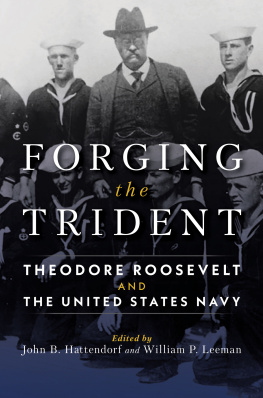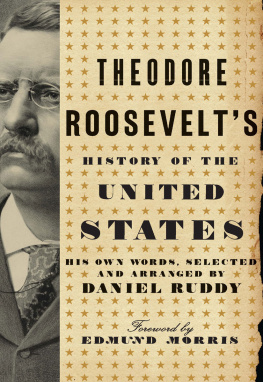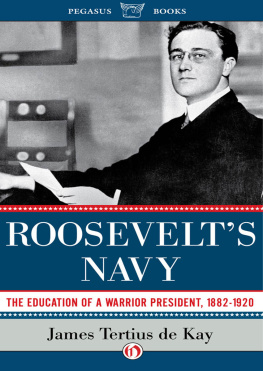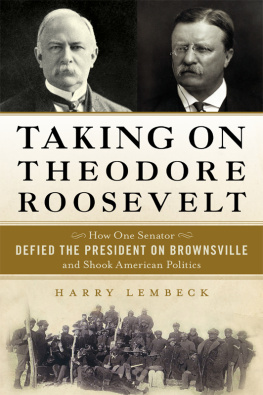


Naval Institute Press
291 Wood Road
Annapolis, MD 21402
2009 by United States Naval Institute
All rights reserved. No part of this book may be reproduced or utilized in any form or by any means, electronic or mechanical, including photocopying and recording, or by any information storage and retrieval system, without permission in writing from the publisher.
ISBN: 978-1-61251-831-2 (eBook)
Library of Congress Cataloging-in-Publication Data
Hendrix, Henry J.
Theodore Roosevelts naval diplomacy : the U.S. Navy and the birth of the American century / Henry J. Hendrix.
p. cm.
Includes bibliographical references and index.
1. United StatesForeign relations19011909. 2. Roosevelt, Theodore, 1858-1919. 3. United StatesHistory, Naval20th century. 4. United States. NavyHistory20th century. 5. United States. NavyCruise, 1907-1909. 6. National securityUnited StatesHistory20th century. I. Title.
E756.H46 2009
973.91'1092dc22
2009009085
14 13 12 11 10 09 9 8 7 6 5 4 32
First printing
Book design: David Alcorn, Alcorn Publication Design
The latest edition of this book has been brought to publication with the generous assistance of Marguerite and Gerry Lenfest.
For Penny
In grateful thanks for your support through twenty years, nine moves, six deployments, and four foreign conflicts; and for giving me a lifetime of love and two gorgeous daughters.
I am forever in your debt.
Contents
I am forty-two years old as I write these words and complete this book. Forty-two is an odd time in life to become an author, especially with my day job as an action officer in the Office of the Secretary of Defense. Suffice to say that I have arrived at this point in my life only because of the support of a multitude of people. As a proper American individualist who hails from the cornfields of Indiana, I am usually repulsed by the popular notion that it takes a village, but in this case it has been all too true. My life and this book have been greatly aided by a series of teachers, organizations, and family members who have supported me in my intellectual odyssey over the past thirteen years.
Mrs. Melva Eddy was my English teacher in high school, and her challenge to me within the classroom was so exacting that when I arrived at Purdue University the only subject that I did not have trouble with was English. She made me believe that I could write something that someone else would want to read. She left a huge hole in my hometown when cancer took her in 2004. Dr. Claude A. Buss was my lead thesis adviser at the Naval Postgraduate School. A career foreign service officer whose commission was signed by Herbert Hoover, Dr. Buss encouraged me in my passion for history and refined my writing skills. I keep a tattered copy of his Whos Who entry in my wallet to remind me what a real life of accomplishment looks like. Dr. David Rosenberg, a superb historian and a Naval Reserve officer to boot, guided me toward my eventual method of utilizing operational history to examine diplomatic incidents. He continues to mentor me to this day.
Organizations have also had their impact upon me. I joined the Theodore Roosevelt Association in 1994 shortly after I became a member of the USS Theodore Roosevelts crew. The associations longtime executive director, Dr. John A. Gable, quickly took me under his wing, not only encouraging me in my writing and research, but also making an effort to introduce me to other Roosevelt historians. Sadly, he passed away before I could complete my doctoral research, but I still feel his presence in my life. When John left us, Professor William Tilchin stepped in to fill his shoes as the editor of the Theodore Roosevelt Association Journal, and as my sounding board and friend. Other leading members of the Theodore Roosevelt Association as well as members of the Roosevelt family have each taken their turn in providing me with guidance, and I am deeply grateful.
No scholar of U.S. naval history could succeed without the assistance of the Naval History Center at the Washington Navy Yard. Its library and archives have become a home away from home for me, and I love nothing better than to be ensconced in a study carrel there with my laptop open, surrounded by books, letters, and journals. My education and research were supported financially by the center, which twice honored me with its Samuel Eliot Morison scholarship as well as its Rear Adm. John D. Hayes Predoctoral Fellowship. I extend special gratitude to Dr. Edward Marolda, until recently the centers Senior Historian, who befriended me in 1997 and invited me to present a paper at a conference on the topic of the Spanish-American War. Since then, he has read nearly every word I have written, including my doctoral thesis. He is truly a scholar and a gentleman.
Dr. Marolda may have read everything I have written, but it is by the editorial efforts of the staff at the U.S. Naval Institute at Annapolis that these words have made their way to you. The two FredsFred Rainbow and Fred Schultzlongtime editors of the Naval Institutes Proceedings and Naval History Magazine, refined my early efforts and actively helped me to become a better writer. Many of the facts contained in this book made their first appearance in articles published in these two journals. With their assistance, I became a member of the institutes editorial board and board of directors, which introduced me to the rest of the dedicated staff of this great organization, including Adam Kane. Adam and my copy editor, Mindy Conner, worked hard to overcome my awful habit of speaking in a historical, passive voice, as well as dealing with the inconsistent nature of my personal and professional schedule. I am deeply honored by my association with these individuals and the entire staff of the Naval Institute.
In August 2003 I was fortunate to be assigned as a Federal Executive Fellow to the Weatherhead Center for International Affairs at Harvard University. While there, I interacted with twenty-one of the most interesting individuals I have ever met. Our daily discussions covered all manner of topics on diplomacy and international security. Our shepherd along the way was Dr. Kathleen Molony, the fellows program director, who served up interesting speakers and events for our consumption. While at Harvard, I had the opportunity to take a degree under the direction of two distinguished diplomatic historians, Professor Akira Iriye and Professor Ernest May. Exposure to the individuals at the Weatherhead Center and to Professors Iriye and May convinced me that it was time to take the step toward a Ph.D., literally the turning point of my adult professional life.
This decision led me to the War Studies Department at Kings College, London. I was blessed to work there with Dr. Alan James and Professor Andrew Lambert in the development of my doctoral thesis. Andrew Lambert, a distinguished naval historian in every sense of the phrase, made a special effort to shepherd me through the ensuing process, working closely with me, mostly at extreme distances, over the three years that followed. As I wrote most of my dissertation while at sea, Andrew would review each chapter quickly and mail his comments back to me via British airmail. It was quite an experience. The fact that I can claim the title Doctor today is largely owing to Professor Lambert.
Next page







